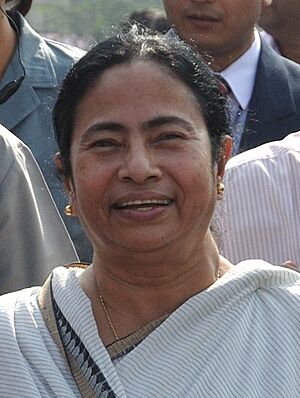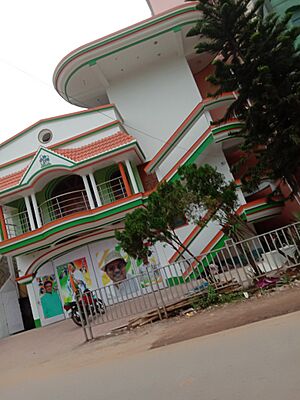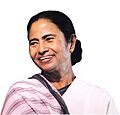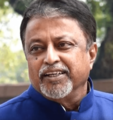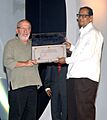Trinamool Congress facts for kids
Quick facts for kids
All India Trinamool Congress
|
|
|---|---|
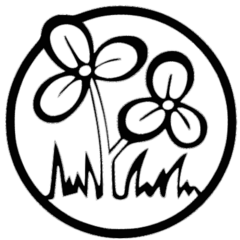 |
|
| Abbreviation | AITC (official) TMC (alternatives) |
| Parliamentary Chairperson | Sudip Bandyopadhyay |
| Lok Sabha leader | Abhishek Banerjee |
| Rajya Sabha leader | Derek O' Brien |
| Founder | Mamata Banerjee |
| Founded | 1 January 1998 |
| Split from | Indian National Congress |
| Headquarters | 30B Harish Chatterjee Street, Kolkata 700026 |
| Newspaper | Jago Bangla (Bengali) |
| Student wing | Trinamool Chaatra Parishad |
| Youth wing | All India Trinamool Youth Congress |
| Women's wing | Trinamool Mahila Congress |
| Labour wing | Indian National Trinamool Trade Union Congress |
| Peasant's wing | Trinamool Kisan Khet Majdur Congress |
| Ideology | |
| Political position | |
| Colours | Green |
| ECI Status | State Party |
| Alliance | NDA (1998–2001; 2001–2004) UPA (2009–2012) I.N.D.I.A. (2023–present) |
| Seats in Lok Sabha |
28 / 543
|
| Seats in Rajya Sabha |
12 / 245
|
| Seats in State Legislative Assemblies |
227 / 4,036
Indian states
222 / 294
(West Bengal)
5 / 60
(Meghalaya) |
| Number of states and union territories in government |
1 / 31
|
| Election symbol | |
| Party flag | |
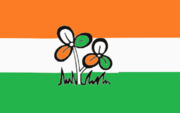 |
|
The All India Trinamool Congress (AITC), also known as Trinamool Congress, is a political party in India. It is very important in the state of West Bengal. Mamata Banerjee started the party on January 1, 1998. It was formed after she left the Indian National Congress party.
The AITC quickly became well-known in West Bengal because of Mamata Banerjee's leadership. Today, it is the ruling party in West Bengal. It is also the third-largest party in India based on the number of its members in Parliament.
The party won a big election in West Bengal in 2011. This victory ended 34 years of rule by the Left Front government. The AITC has won the state election three times in a row. It has been the ruling party in West Bengal since May 20, 2011. Mamata Banerjee is the chairperson, or leader, of the party.
Contents
Party History
How the Party Started
Mamata Banerjee was a member of the Indian National Congress for over 26 years. In 1998, she left that party and created the Trinamool Congress (TMC). The official symbol of the TMC is Jora Ghas Phul, which means two flowers with grass.
In the 1998 national elections, the TMC won seven seats. In the next national election in 1999, the party won eight seats. This was an increase of one seat. In 2000, the TMC also won the local elections in Kolkata.
The party first joined an alliance called the National Democratic Alliance (NDA). They were part of the government led by Atal Bihari Vajpayee. In 2001, the TMC won 60 seats in the state elections. They became the main opposition party. However, they lost many seats in the 2004 national elections and the 2006 state elections. After that, they left the NDA.
Nandigram Movement
In December 2006, people in Nandigram were told that their land would be taken for a chemical plant. About 70,000 people would lose their homes. People started protesting against this plan, and the TMC helped lead the movement.
A group called the Bhumi Uchchhed Pratirodh Committee was formed to protest. On March 14, 2007, police fired on the protesters. Fourteen villagers were killed, and many more went missing. This event caused a lot of anger against the government. It also helped the TMC gain more support for future elections.
Elections After Nandigram
In the 2009 national election, the TMC won 19 seats in West Bengal. They worked with the Indian National Congress. Mamata Banerjee became the Minister of Railways in the government led by Manmohan Singh.
In 2010, the party won 97 out of 141 seats in the Kolkata local elections. They also won most of the other local elections.
In Government
In the 2011 West Bengal state election, the TMC and its allies won 227 seats. This was a big victory, as they defeated the Left Front government that had been in power for 34 years. The TMC alone won 184 seats, which meant they could govern without needing an alliance.
Mamata Banerjee became the Chief Minister of West Bengal. On September 18, 2012, she decided to stop supporting the national government. This was because the TMC's requests on certain economic policies were not met.
In the 2014 national elections, the TMC won 34 out of 42 seats in West Bengal. Because of their success in several states, the Election Commission of India recognized TMC as a national political party on September 2, 2016.
The party won the state election again in 2016. Mamata Banerjee continued as Chief Minister. In the 2019 national election, the TMC won the most seats in West Bengal. However, they lost some seats to the Bharatiya Janata Party.
Mamata Banerjee's government was reelected in the 2021 state election. They won by a large number of votes.
Presence in Other States
The Trinamool Congress has tried to expand its presence beyond West Bengal. Here's a look at some of the states where they have been active:
Arunachal Pradesh
In the 2009 state election in Arunachal Pradesh, the Trinamool Congress won five seats.
Assam
In the 2001 state election in Assam, a Trinamool Congress candidate won one seat. In August 2021, Sushmita Dev, a former Member of Parliament, joined the Trinamool Congress. She is now a Member of Parliament in the Rajya Sabha. In 2022, Ripun Bora, another former Member of Parliament, also joined the AITC.
Bihar
In November 2021, Kirti Azad, a former Member of Parliament, joined the TMC.
Goa
The party started working in Goa in September 2021. Former Chief Minister Luizinho Faleiro joined the party. Other notable people like former footballer Denzil Franco also joined. In the 2022 Goa state election, the party received 5.2% of the votes.
Haryana
In November 2021, Ashok Tanwar, a former political leader, joined the TMC.
Kerala
The Kerala Pradesh Trinamool Congress started in 2009. In the 2014 national elections, their candidates ran in five areas. The party is active in all 14 districts of Kerala.
Manipur
In the 2012 state elections in Manipur, the party won eight seats. They became the main opposition party in the state assembly. In the 2017 state elections, they won only one seat.
Meghalaya
In 2004, a TMC candidate won a seat in the national election from Meghalaya. In November 2021, former Chief Minister of Meghalaya, Mukul Sangma, and 11 other state assembly members joined the TMC. This made the TMC the largest opposition party in the Meghalaya Legislative Assembly. In the 2023 state election, the Trinamool Congress won five seats.
Punjab
The party started working in Punjab before the 2017 state elections. They ran candidates in 20 areas but did not win any seats. Since 2019, the party has continued its work in Punjab under new leadership.
Tripura
In 2016, six state assembly members from the Indian National Congress joined the TMC in Tripura. They wanted to oppose the ruling party there. Later, these members left the TMC and joined another party. In the 2021 local elections in Tripura, the TMC won one seat.
Uttar Pradesh
The party's state unit in Uttar Pradesh was set up in 2005. In 2012, Shyam Sunder Sharma won a special election in the Mant area on an AITC ticket. In October 2021, two senior leaders from Uttar Pradesh, Rajeshpati Tripathi and Laliteshpati Tripathi, joined the AITC.
Electoral Performance
National Election Results
| Year | Lok Sabha | Party leader | Seats contested |
Seats won | Seats +/- | Vote % (in whole country) |
Vote swing | Ref. |
|---|---|---|---|---|---|---|---|---|
| 1998 | 12th Lok Sabha | Mamata Banerjee | 29 |
7 / 543
|
2.42% | |||
| 1999 | 13th Lok Sabha | 29 |
8 / 543
|
2.57% | ||||
| 2004 | 14th Lok Sabha | 33 |
2 / 543
|
2.07% | ||||
| 2009 | 15th Lok Sabha | 26 |
19 / 543
|
3.20% | ||||
| 2014 | 16th Lok Sabha | 131 |
34 / 543
|
3.84% | ||||
| 2019 | 17th Lok Sabha | 62 |
22 / 543
|
4.11% | ||||
| 2024 | 18th Lok Sabha | 47 |
29 / 543
|
4.37% |
State Election Results
| Vote share in consecutive West Bengal Assembly elections | ||||
|---|---|---|---|---|
| 2021 | 48.02% | |||
| 2016 | 44.91% | |||
| 2011 | 38.93% | |||
| 2006 | 26.64% | |||
| 2001 | 30.66% | |||
| Election Year | Party leader | Seats contested |
Seats won | Change in seats | Percentage of votes |
Vote swing | Popular vote | Result |
|---|---|---|---|---|---|---|---|---|
| Arunachal Pradesh Legislative Assembly | ||||||||
| 2009 | 26 |
5 / 60
|
15.04% | – | 86,406 | Others | ||
| Assam Legislative Assembly | ||||||||
| 2001 | 23 |
1 / 126
|
0.55% | – | 58,361 | Others | ||
| 2011 | 126 |
1 / 126
|
2.05% | – | 283,683 | Others | ||
| Goa Legislative Assembly | ||||||||
| 2022 | Luizinho Faleiro | 29 |
0 / 40
|
5.2% | – | 49,480 | Others | |
| Manipur Legislative Assembly | ||||||||
| 2012 | Maibam Kunjo | 60 |
7 / 60
|
17% | – | 237,517 | Opposition | |
| 2017 | 60 |
1 / 60
|
1.4% | 23,304 | Others | |||
| Meghalaya Legislative Assembly | ||||||||
| 2023 | Mukul Sangma | 56 |
5 / 60
|
13.78% | 255,742 | Opposition | ||
| Tripura Legislative Assembly | ||||||||
| 2018 | 24 |
0 / 60
|
0.3% | – | 6,989 | Others | ||
| 2023 | Pijush Kanti Biswas | 28 |
0 / 60
|
0.88% | – | 22,316 | Others | |
| Uttar Pradesh Legislative Assembly | ||||||||
| 2012 (By-election) | 1 |
1 / 403
|
– | Others | ||||
| West Bengal Legislative Assembly | ||||||||
| 2001 | Mamata Banerjee | 226 |
60 / 294
|
30.66% | – | 11,229,396 | Opposition | |
| 2006 | Mamata Banerjee | 257 |
30 / 294
|
26.64% | 10,512,153 | Opposition | ||
| 2011 | Mamata Banerjee | 226 |
184 / 294
|
38.93% | 18,547,678 | Government | ||
| 2016 | Mamata Banerjee | 293 |
211 / 294
|
44.91% | 24,564,523 | Government | ||
| 2021 | Mamata Banerjee | 290 |
215 / 294
|
48.02% | 28,968,281 | Government | ||
Presidential Election Results
| Election | Candidate | First round | Second round | Result | ||
|---|---|---|---|---|---|---|
| Votes | % | Votes | % | |||
| 2022 | Yashwant Sinha | 380,177 | 35.97 | N/A | Lost |
|
Party Symbols and Slogans
The name "Trinamool" means 'grassroots' in Bengali. The party's election symbol, Jora Ghas Phul (two flowers with grass), also represents this idea. It shows a plant growing from the ground. The name "All India" in the party's full name shows that it aims to be a national party.
Ma Mati Manush (Bengali: মা মাটি মানুষ) is a famous slogan created by Mamata Banerjee. It means "Mother, Motherland, and People." This slogan became very popular during the 2011 state election in West Bengal. Mamata Banerjee also wrote a book and recorded a song with this title.
The slogan Joy Bangla is also used by Mamata Banerjee and her party. It helps create a sense of identity for Bengali people in India. It is often used to end political speeches.
In the 2021 state election, the party used the song "Khela Hobe" (meaning "Game On" or "The Game Will Happen"). This song was written by a young member of the party. The phrase "Khela Hobe" has since been used by other political parties across India.
Leadership
The main decision-making group of the party is its Core Committee.
- Mamata Banerjee — She is the founder and chairperson of the party. She is also the leader of the party in the West Bengal Legislative Assembly and the Chief Minister of West Bengal.
- Abhishek Banerjee — He is the General Secretary of the party.
- Derek O'Brien — He is the leader of the party in the Rajya Sabha (one of India's two houses of Parliament).
- Sudip Bandyopadhyay — He is the leader of the party in the Lok Sabha (the other house of Parliament).
- Kakoli Ghosh Dastidar — She is the Deputy leader of the party in the Lok Sabha.
- Kalyan Banerjee — He is the Chief Whip of the party in the Lok Sabha.
- Sukhendu Shekhar Roy — He is the Chief Whip of TMC in Rajya Shabha.
- Mukul Sangma — He was the Leader of the Opposition in the Meghalaya Legislative Assembly.
- Aroop Biswas — He is the Treasurer of the party.
- Sobhandeb Chatteejee - He is the Deputy Leader of the House of West Bengal Legislative Assembly.
The party's executive committee is called the National Working Committee.
Images for kids



